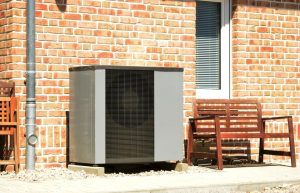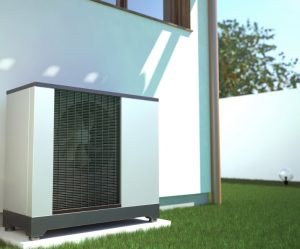Choosing the right type of heating for your property is essential for many reasons. It will have an impact on your energy bills, carbon footprint, and ongoing costs for things like servicing and maintenance. Most people will choose a traditional boiler, whether it is gas, oil, electric, or biomass. However, there is another option; heat pumps. They are becoming more and more popular, so you should definitely consider one.
What is a heat pump?
 Traditional boilers work by burning a fuel to heat water that can then circulate to radiators and taps or a storage tank to use later. Electric boilers are similar but they use a heating element rather than having an actual flame. Heat pumps are an alternative to both that can generate renewable heat without any use of fossil fuels.
Traditional boilers work by burning a fuel to heat water that can then circulate to radiators and taps or a storage tank to use later. Electric boilers are similar but they use a heating element rather than having an actual flame. Heat pumps are an alternative to both that can generate renewable heat without any use of fossil fuels.
There are two types of heat pump; air source and ground source. They have some similarities in that they are both sustainable and renewable. However, there are some important differences to think about.
Air source heat pumps
This type of pump works by taking heat from the air outside your home. It transfers this to a liquid refrigerant that is at a lower temperature. It then uses a compressor to boost it to a higher temperature before condensing the liquid to release the heat. From there it can send it directly to the radiators in the property or to a cylinder to heat water that can then feed taps. Just think of the process as refrigeration but in reverse.
The system above is also known as an air-to-water heat pump. They are not the only option here. You can also choose an air-to-air system. They are a little different in how they use the heat that enters your property. Instead of sending it to radiators or a cylinder, they circulate it through the property with a series of fans. However, they cannot produce hot water. They are a good alternative to air conditioning units, especially because they can work in reverse and provide cooling in hot months. But, they cannot replace a boiler and are not eligible for grants or other incentives.
Ground source heat pumps
The difference with this type of pump is that it utilises the heat from the earth. What happens is there is a loop or network of pipes under the ground. Fluid flows through the pipework to absorb the heat. This travels to the heat pump where a compressor increases the temperature just like with an air source pump. The process is then exactly the same with the heat going directly to radiators or to a hot water cylinder.
What are the benefits?
 Both air-to-water and ground source pumps are renewable ways of generating heat and hot water in various properties. They can replace traditional boilers to save on using fossil fuels. This can provide cleaner, more sustainable energy. It will reduce your carbon footprint too.
Both air-to-water and ground source pumps are renewable ways of generating heat and hot water in various properties. They can replace traditional boilers to save on using fossil fuels. This can provide cleaner, more sustainable energy. It will reduce your carbon footprint too.
In terms of operating costs, both systems are generally cheaper to run than traditional boilers. They do use some electricity to power the compressors in the systems. However, this is only a relatively small amount and you’ll benefit from generating more heat for what you use.
The systems also require much less maintenance than boilers. This is because they are not burning any fuels.
The costs
One thing many people note when they look at heat pumps is the cost of installation. It can get quite expensive. It is typically anywhere from £9,000 to £11,000 for an air-to-water system (Energy Saving Trust figures). Ground pumps are more expensive due to the cost of installing the underground pipework. The cost here according to EST can be from £10,000 to £18,000.
It is important to note that the cost will vary depending on a number of important factors. This includes:
- Property size
- Insulation quality
- What temperature you want the property to be
- Additional costs for radiator upgrades if necessary
Grants
While installing the heat pumps can be costly and disruptive, there are a number of grants to ease the financial burden. This can give you funds to help cover part of the cost of upgrading.
There are also financial incentives to upgrade to this type of heating. You may qualify for the Renewable Heat Incentive. If so you can receive regular payments over the next seven years for the heat you generate. The scheme is available until March 2022 so there is still time to upgrade and apply.
Is it worth it?
Depending on what type of heating system you have at the moment, upgrading to a heat pump could save you as much as £1,400 a year according to the EST.
The biggest savings with heat pumps will generally come from upgrading old, inefficient gas, oil, and electric systems. For example, you could save between £1,200 and £1,300 per year if you replace an LPG boiler with a G rating. You could save up to £1,000 by replacing an old electric storage heater.
However, you won’t enjoy this kind of saving if you replace newer gas or oil boilers. Models with an A rating are very efficient. If you switch to a heat pump it could actually increase your energy bill by £80 to £100 per year. But, you will have a substantially lower carbon footprint and be using renewable energy sources.
Want to learn more about heat pumps?
If you are considering your options, you should definitely look at the pros and cons of this technology. Warm would love to help. We offer a fantastic service and can help you to get in touch with expert installers and engineers across the UK. You can even ask for free quotes.



